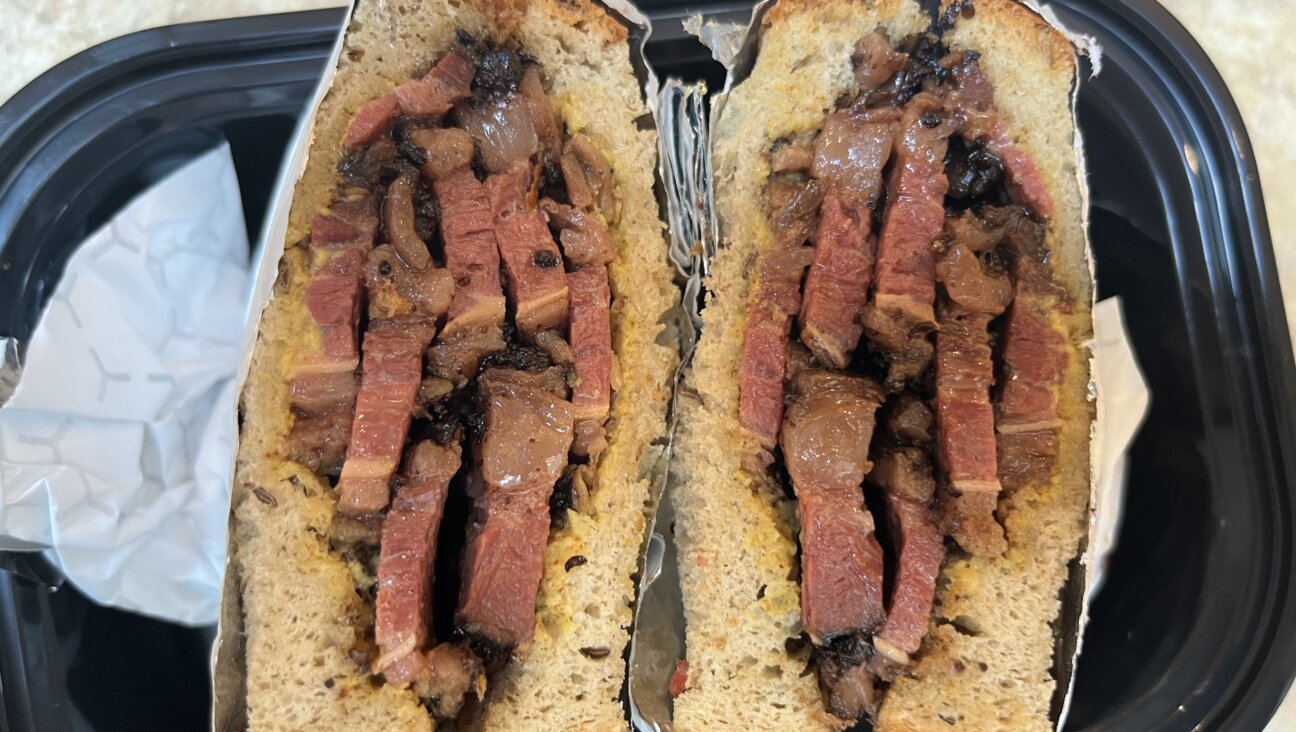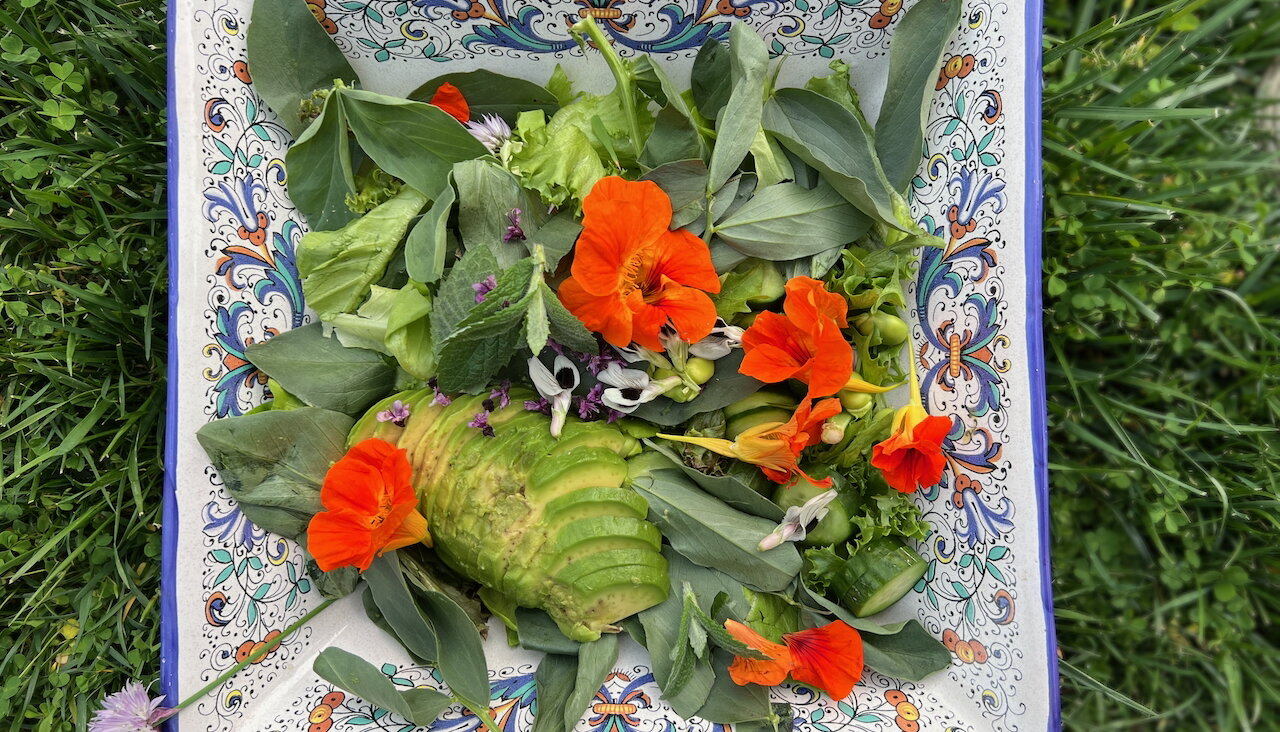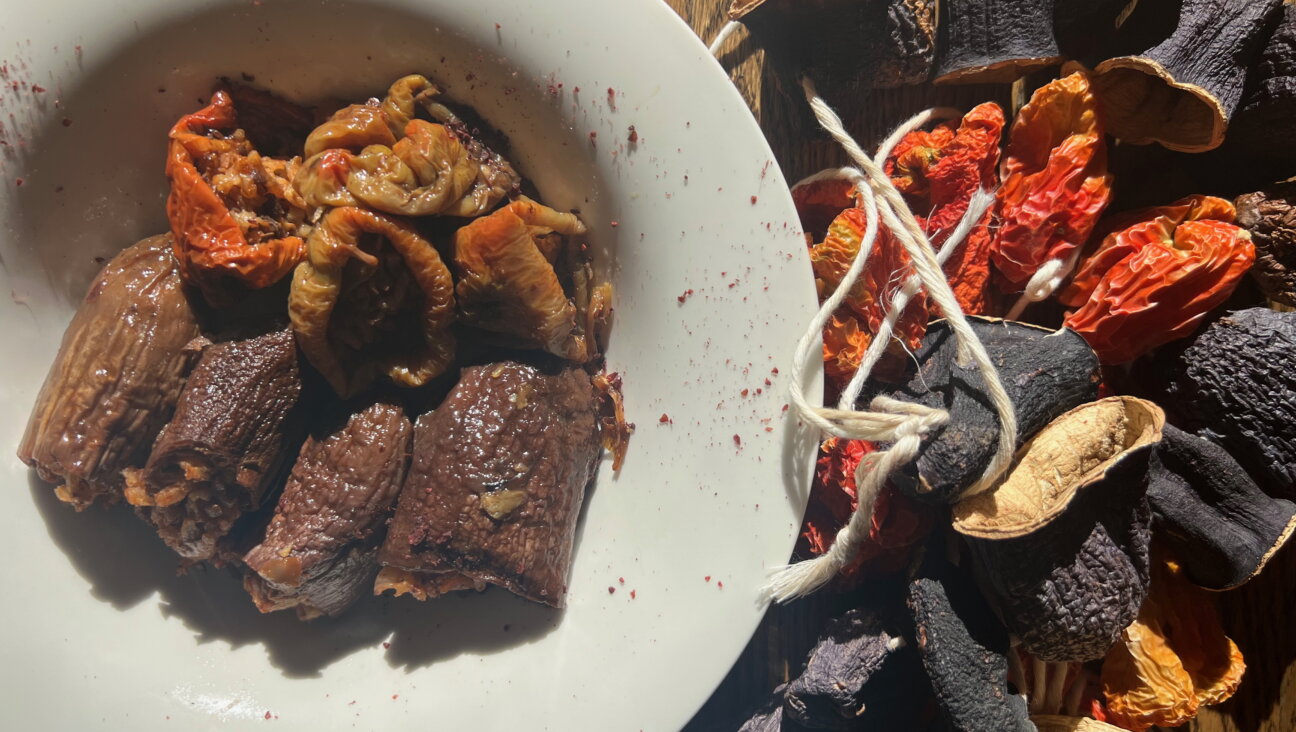Molly on the Range: Tu B’Shvat Tart

Five months ago I moved from downtown Brooklyn to a farm in a small town on the border of North Dakota and Minnesota, population approximately four Jews (read: not enough Jews to support a local deli or even a Zomick’s presence at the town Target). Having lived in or near a city for my entire life, it didn’t occur to me that a town could exist without a pastrami sandwich or a place to get a bagel. But here, there is not a matzo ball in sight.
Celebrating my Jewishness in a sea of Scandinavians (and Midwesterners) has been a wild and rewarding adventure.
Molly Yeh
Every craving I get for Bubbe food means I must make it from scratch. Every macaroon, latke, and plate of matzo brei. Of course many of these dishes are best when made from scratch anyway, but a new element of pressure and satisfaction is introduced when Zabar’s is 1,500 miles away.
For one thing, there’s all the time in the world for that kind of cooking here. I knead my own challah dough and mash my own hummus, and eventually I hope to smoke my own pastrami. Soon I’ll have the means to do things like make matzo balls with eggs from my own chickens and wheat from my boyfriend’s family farm, and then plop them into broth made with homegrown vegetables.
Through this new column, I hope to show you some fun ways to make Jewish and Israeli dishes from scratch, using ingredients that you can find nearly anywhere. Because if I can find them, you can find them.
Let’s start with something sweet to celebrate! A tart. A Tu B’Shevat tart because not only does today mark the first day of Molly On The Range, but it also marks the New Year for Trees. I won’t be planting one since winter temperatures here dip below -40, but I’ll surely partake in the food traditions associated with the holiday. One of these customs is to eat from the Seven Species: wheat, barley, olives, grapes, pomegranate, figs, and dates; another is to eat plenty of nuts and exotic fruits. This tart combines a few of these and leaves room for any exotic fruits that strike your fancy.
Tu B’Shvat Tart
Inspired by Emma Galloway’s Mulberry Lemon Yoghurt Tart
Crust:
2 cups raw almonds
1/2 cup firmly packed medjool dates
1/2 cup firmly packed dried figs
3 tablespoons coconut oil (melted)
a good pinch of kosher salt
Topping:
1/2 cup pomegranate juice
3 tablespoons honey
2 cups plain or vanilla yogurt (can use soy or coconut yogurt for a dairy free option)
a couple handfuls of pomegranate seeds or any exotic fruits you’d like
optional: toasted slivered almonds or other nuts
Combine the crust ingredients in a food processor and blend until sticky, which could take around one minute. To test if it’s blended enough, squeeze a small handful of the crumbly mixture. If it sticks together, you’re good to go, otherwise, continue to blend.
Molly Yeh
Line the bottom of a 9-inch pie pan with parchment and then firmly pack the mixture on the bottom and sides. Refrigerate for about 20 minutes or until ready to use.
In a small saucepan over medium heat, whisk together the pomegranate juice and honey, and then boil, whisking often, for 5 minutes to create a syrup. Let cool for about ten minutes and then mix half of the syrup into the yogurt.
Molly Yeh
Spread the yogurt evenly over the crust, drizzle it with the remaining syrup, and then top with pomegranate seeds, other fruits, and nuts, if using. You can serve it right away, which may yield a bit of sloppiness when you cut it, but it is best to let it set for an hour in the fridge to get a cleaner cut.
Enjoy!
The Forward is free to read, but it isn’t free to produce

I hope you appreciated this article. Before you go, I’d like to ask you to please support the Forward.
Now more than ever, American Jews need independent news they can trust, with reporting driven by truth, not ideology. We serve you, not any ideological agenda.
At a time when other newsrooms are closing or cutting back, the Forward has removed its paywall and invested additional resources to report on the ground from Israel and around the U.S. on the impact of the war, rising antisemitism and polarized discourse.
This is a great time to support independent Jewish journalism you rely on. Make a gift today!
— Rachel Fishman Feddersen, Publisher and CEO
Support our mission to tell the Jewish story fully and fairly.
Most Popular
- 1

Fast Forward Ye debuts ‘Heil Hitler’ music video that includes a sample of a Hitler speech
- 2

Opinion It looks like Israel totally underestimated Trump
- 3

Culture Cardinals are Catholic, not Jewish — so why do they all wear yarmulkes?
- 4

Fast Forward Student suspended for ‘F— the Jews’ video defends himself on antisemitic podcast
In Case You Missed It
-

Fast Forward In first Sunday address, Pope Leo XIV calls for ceasefire in Gaza, release of hostages
-

Fast Forward Huckabee denies rift between Netanyahu and Trump as US actions in Middle East appear to leave out Israel
-

Fast Forward Federal security grants to synagogues are resuming after two-month Trump freeze
-

Fast Forward NY state budget weakens yeshiva oversight in blow to secular education advocates
-
Shop the Forward Store
100% of profits support our journalism
Republish This Story
Please read before republishing
We’re happy to make this story available to republish for free, unless it originated with JTA, Haaretz or another publication (as indicated on the article) and as long as you follow our guidelines.
You must comply with the following:
- Credit the Forward
- Retain our pixel
- Preserve our canonical link in Google search
- Add a noindex tag in Google search
See our full guidelines for more information, and this guide for detail about canonical URLs.
To republish, copy the HTML by clicking on the yellow button to the right; it includes our tracking pixel, all paragraph styles and hyperlinks, the author byline and credit to the Forward. It does not include images; to avoid copyright violations, you must add them manually, following our guidelines. Please email us at [email protected], subject line “republish,” with any questions or to let us know what stories you’re picking up.















